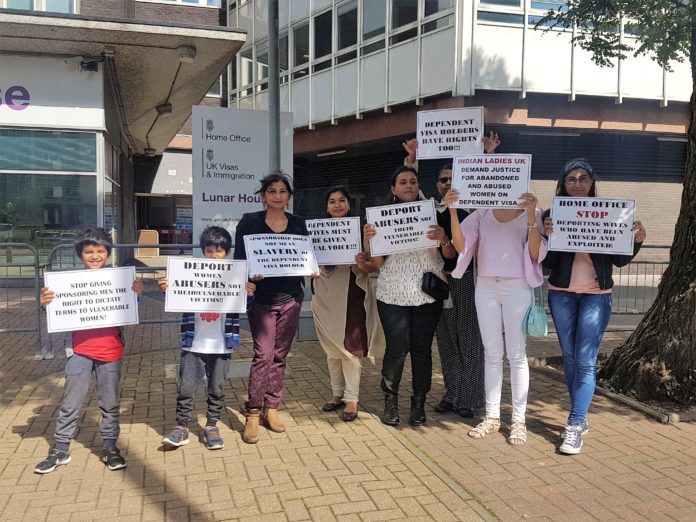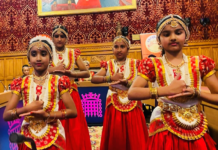“The day I was abandoned in India by my husband, would be the start of the darkest period of my life. It has left permanent mental and emotional scars. But I was one of the luckier ones a I was able to rebuild my life. Most are not so lucky and that’s why I’m here.”
The words of Shafiqua Mohammad, who was among a group of women who gathered outside London’s Lunar House – the headquarters of the Home Office in Croydon – to protest against the exploitation of Indian women on spousal visas in the UK.
The protest was organized by Indian Ladies in the UK (ILUK), Britain’s largest Indian women’s group for first generation migrants. Shafiqua Mohammed travelled down from Peterborough for the protest and was joined by member of ILUK as well as other victims.
They are among the thousands of women who move to the UK on dependent visas, following professional husbands.
Hundreds of these women find themselves abused and exploited due to a provision in immigration law in which the sponsoring partner – the husband – is able to cancel his partner’s visa leaving the women in limbo.
Their exploitation is made worse by the fact that these women have no recourse to public funds leading to women experiencing serious mental health problems while others are left destitute and ostracized by families and communities.
Shafiqua Mohammad was one such victim.
She explained: “I married my husband in 2012 and came here to the UK the same year. We were married for two years during which I suffered untold mental and physical torture at the hands of the man who was supposed to protest and care for me. Throughout my ordeal, my husband never missed an opportunity to remind me that I was entirely at his mercy as he could cancel the visa. He never missed an opportunity tell me that all he had to do was to tell the Home Office that the “relationship did not exist anymore” and I would be deported immediately back to India”.
As Shafiqua says, these women, who leave behind extensive family networks in India, often live in a constant state of insecurity, counting down the five long years that they are required to remain as “dependent” spouses until they are able to attain any rights for themselves.
If the marriage produces a child, the child becomes eligible for British citizenship as the child of a settled individual. The wife on the other hand is required to remain as a “dependent” for a period of five years before she is able to apply for permanent settlement.
In the case of Shafiqua, her husband refused to renew her dependent visa after two years and informed the Home Office that the relationship was no more – all while the couple were still very much in a marriage, albeit an abusive one. Her husband however, didn’t find it necessary to seek a legal separation or an amicable parting of any sort and wanted, in Shafiqua’s words and those of many other victims, to “rid himself of something he didn’t want with as little fuss as possible using the laws of the United Kingdom”.
Shafiqua was subsequently sent back to India. As she says, she was luckier than most as she was able to secure a job in the UK and return here to better rebuild her life.
ILUK has, just in the past 24 months, come across and provided support to dozens of victims whose husbands, for myriad reasons have routinely abused their position of power, leaving women exploited, abused and often dumped in India after travelling there in the guise of a holiday.
The reasons are manifold – the marriage breaks down, there are “dowry” issues (for example; the woman’s family being unable or unwilling to pay an amount demanded by the husband and/or his family); backward cultural reasons (for example, women who want to work, socialize or dress in a different manner are targeted by their husbands who will bar their wives from going out, having their own money and even bar them from having a phone so as to contact friends or family); money issues (for example, we’ve seen numerous instances where a woman who has found work has had her salary taken away by the husband because the husband feels he is “losing control” by allowing the woman to work and be self-sufficient) and so on and so forth.
Each case is different but equally harrowing for the woman.
In a number of the most horrific instances, women have been taken to India ostensibly for a “holiday” only for them to be abandoned.
In one recent case, a husband – a British citizen working as a regional manager for a well-known fast food brand, who had married a lady from Gujarat – traveled to India for a holiday with the couple’s two young children.
One day, under the guise of taking the children to a temple, the man took his wife’s passport and telephone and fled India with the children. She contacted ILUK and we helped organize an emergency passport and a short term visa for her to return to the UK where she continues to fight her case. (The husband has since fled to his parent’s native Madagascar with the children).
In another case, the husband traveled to India with the wife and abandoned her there after stealing her British Residency Permit and handing it over to his parents. The moment he returned to London, he informed the home office that he was “no longer married to his wife” and to cancel her residency permit. The Home Office, based on his word alone, has proceeded to cancel her visa barring her from seeking justice in the UK.
Such separations lead to women being ostracized by their families and communities given the inferior status of women in India. They are kept in limbo, unable to return to the UK, unable to return to their homes in India due to societal norms. Based on the staggering number of cases that ILUK has come across in the past two years, it is reasonable to assume that it is a widespread problem.
Among the others at today’s protest was Prashanti who participated in protest at the plight of a close friend who had travelled to India on holiday in 2016. He subsequently returned to the UK alone and promptly informed her that her dependent visa would not be renewed and that she would have to remain in India to “look after his parents”. According to Prashanti, her friend’s husband had not been happy that she had found herself a job with excellent prospects. Prashanti says her friend has turned into an emotional wreck.
Prashanti and the others who attended today’s demonstration joined together in calling for the process of cancelling a woman’s dependent visa be made a more stringent one by the Home Office.
At the moment, a man needs only to write a letter informing of a separation, which in turn leads to the cancellation of a dependent visa in a matter of 7 days.
ILUK are calling on the Home Office to demand documentation proving that there has been a legal separation – meaning that the wife has been granted her rights under the separation – before proceeding with the cancellation of a visa.
Alternately, particularly in the cases of abandonment of wives in India, a provision must be put in place to ensure that the Home Office is aware of the wife’s position and that their most basic human rights are protected. Obtaining the wife’s consent prior to cancelling her visa is paramount.
The abuse of these women is merely exacerbated as one of the conditions of their dependent visa is that they have “no recourse to public funds”.
As a result, women abandoned in the UK are unable to find help through local councils.
As it stands, the system is ripe for exploitation by men who use, abuse and discard women at will and the authorities must pay immediate attention to this issue to save hundreds of other women becoming destitute and their rights be preserved.
Poonam Joshi, founder of Indian Ladies UK, said: “We have women here today who have come from far and wide in the UK and who hail from far and wide in India. It’s a testament to the fact that this is a problem that is widespread. It is appalling that migrants bring their homegrown prejudices about the treatment of women and outdated ideas about caste, dowry etc with them to the UK. While Britain’s immigration system has been generous to millions, it is also quite easily exploited by individuals who have no sense of right and wrong when it comes to the treatment of women. It is inexcusable that even a single woman is put through this kind of trauma and we will not stop this campaign until these women are given equal voice by the Home Office.”
An online petition calling for the change in regulation has already garnered 100’s of signatures in 24 hours.
https://www.change.org/p/home-office-justice-for-women-on-spouse-visa
About Indian Ladies UK :
Founded in 2015, ILUK’s primary focus is campaigning on behalf of victims of domestic violence, forced marriage, spousal abandonment and international child abduction.
The group has helped hundreds of women in the UK in a variety of ways, including providing accommodation and assistance to women who have been abused to spearheading cross-border efforts to reunite children – some as young as 2 – with their mothers.
ILUK is self-funded and resourced by its members, 21,000 first generation migrant women who hail from right across India and who represent the entire socio-economic spectrum.
Readers like you, make ESHADOOT work possible. We need your support to deliver quality and positive news about India and Indian diaspora - and to keep it open for everyone. Your support is essential to continue our efforts. Every contribution, however big or small, is so valuable for our future.












Speak out and fight for your rights. Indian women be brave.
So pleased to read this comment. Men like you inspire us and give us strength.
It is always desirable and in the wider interest of the readers and the community, as a whole, if the address or contact details of such oganisations as Indin Ladies UK given while publishing details of the work they do.